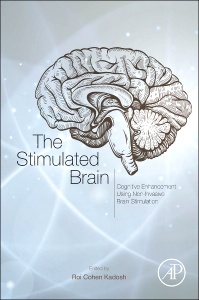Description
The Stimulated Brain
Cognitive Enhancement Using Non-Invasive Brain Stimulation
Coordinator: Cohen Kadosh Roi
Language: English
Subject for The Stimulated Brain:
568 p. · 15x22.8 cm · Hardback
Description
/li>Contents
/li>Readership
/li>Biography
/li>Comment
/li>
The Stimulated Brain?which garnered an Honorable Mention for Biomedicine & Neuroscience at the 2015 PROSE Awards from the Association of American Publishers?presents the first integration of findings on brain stimulation from different research fields with a primary focus on Transcranial Electrical Stimulation (tES), one of the most frequently used noninvasive stimulation methods.
The last decade has witnessed a significant increase in the amount of research exploring how noninvasive brain stimulation can not only modulate but also enhance cognition and brain functions. However, although Transcranial Magnetic Stimulation (TMS) and particularly tES have the potential to become more widely applicable techniques (as they come with none of the risks associated with deep brain stimulation) the reference literature on these neurotechnologies has been sparse.
This resource provides a broad survey of current knowledge, and also marks future directions in cognitive and neuro-enhancement. It expands our understanding of basic research findings from animals and humans, including clear translational benefits for applied research and the therapeutic use of noninvasive brain stimulation methods. The book's coverage includes a primer that paves the way to a more advanced knowledge of tES and its physiological basis; current research findings on cognitive and neuro-enhancement in animals and typical and atypical human populations, such as neurological patients; and discussions of future directions, including specific neuroethical issues and pathways for collaboration and entrepreneurialism.
The Stimulated Brain is the first book to provide a comprehensive understanding of different aspects of noninvasive brain stimulation that are critical for scientists, clinicians, and those who are interested in ?stimulating their minds by exploring this fascinating field of research.
The Basis 1. The History of Electrical Brain Stimulation 2. Primer to Stimulation Methods 3. Safety: Cognitive and Physical Side Effects 4. Modeling Work 5. Electrical Brain Stimulation in Animals and Non-Human Primates 6. The Physiological Basis of Brain Stimulation
Improving Functions in the Typical Brain 7. Sensory System 8. Motor System 9. Effects of Brain Stimulation on Declarative and Procedural Memories 10. Attentional System 11. High-Level Cognitive Functions in Healthy Subjects
Improving Functions in the Atypical Brain 12. Non-Invasive Brain Stimulation in Neurological Disorders 13. Transcranial Direct Current Stimulation for Cognitive and Language Dysfunction in the Elderly 14. Psychiatric Illnesses 15. The Addictive Brain
Future Perspectives 16. Improving Education 17. A Brief Guide to the Scientific Entrepreneur 18. Neuroethical Aspects 19. The Future Usage of Brain Stimulation and Challenges
Advanced students and researchers in cognitive neuroscience, neurology, physiology and developmental psychology.
- Honorable Mention for Biomedicine & Neuroscience in the 2015 PROSE Awards from the Association of American Publishers
- The only reference on the market to focus on transcranial electrical stimulation (tES)
- Coverage across technical, historical, and application topics makes this the single, comprehensive resource for researchers and students
- Edited book with chapters authored by international leaders in the fields of medicine, neuroscience, psychology, and philosophy—providing the broadest, most expert coverage available
These books may interest you

Transcranial Brain Stimulation 208.65 €

Transcranial Brain Stimulation 74.82 €


